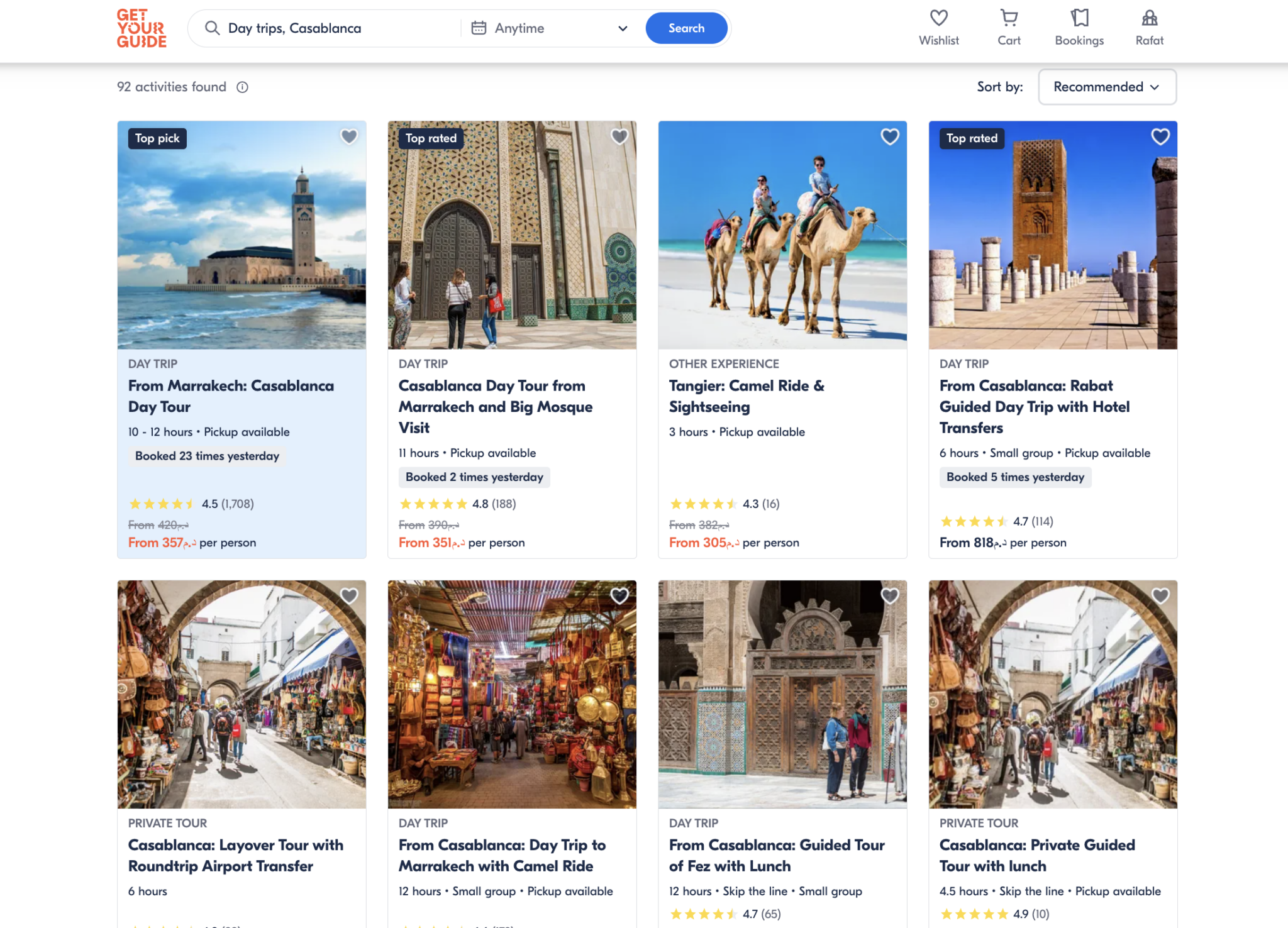Interview: Trivago Will Focus on Growth Over Profitability for Years to Come, CFO Says

Skift Take
You are going to see a lot more of that Trivago Guy or Trivago Woman, or maybe their eventual replacements on television over the next few years.
That’s because Trivago, although it believes in speed when it comes to product rollouts, believes it has “years and years” of growth ahead of it around the world, and the company is in no rush to tamp down its massive advertising spend — 87 percent of revenue in 2016, or around $738 million — to emphasize “rapid profitability improvements.”
That’s according to Trivago CFO Axel Hefer, who visited Skift’s offices in Manhattan May 25, and sat down for an interview with members of the Skift editorial and research teams.
In addition to explaining some of Trivago’s advertising strategy and its lack of appetite to make major acquisitions because it likes its own brand just fine, Hefer spoke about his view that the hyper focus on the company’s December 16 initial public offering was overblown, and how difficult it was to really explain Trivago’s prospects to investors in a roadshow format.
>> Read More: Don’t Look for Trivago to Jump on the Metasearch Buying Spree
He joined the company earlier in 2016 as a precursor to its IPO, and he explained why there were no company-wide celebrations to mark the occasion.
It became apparent from the interview that Hefer — and his hotel-metasearch company — hold a lot of seemingly contrarian views.
For example, Trivago’s organizational structure is not top-down. The company, which had a handful of managing directors as leaders, was basically forced to name a CEO, Rolf Schrömgens, before the IPO because the U.S. Securities and Exchange Commission required a titular top executive.
The Trivago CFO also argues that the travel industry overemphasizes certain trends, including the type of computing device a customer is using, and the distinction between traditional and alternative accommodations.
“I think it doesn’t really matter which device a user uses as long as he’s your user,” Hefer said.
Ah, that’s the key. For a company that believes speed is essential in testing and rolling out new products, Hefer has a surprisingly laid back attitude toward the company’s sharing economy offerings and entry into China, where he acknowledges Trivago hasn’t yet found a winning formula.
The interview follows:
Skift: Looking back at the IPO, the initial share price wasn’t that great compared to what you expected. How did the IPO change the company in terms of what you can do? We were also going to ask you what was it like that night? Was the champagne put on hold?
Axel Hefer: No we had champagne but actually we had a lot of other drinks afterwards [laughter]. So anyway, one of my key learnings going through that process is that there is far too much focus on this one day. I personally completely overestimated how much you can communicate during the roadshow. The reality is it [Trivago] sounds like a simple product but the reason that we are all so excited about it and why we see so much opportunity are more complex than what you can explain in one meeting.
The reality is most of these people you met for the first time; you are super-stressed, you are rushed. You’ve got 45 minutes and so you can’t really expect that people really understand what you want to say. You just don’t have time. So I think this focus on the first day [and whether the stock] is higher or lower or left or right or is it a good market or a bad market or bull or bear market or whatever, I think that is wrong.
I mean, how much does it really matter? It’s one step and then what really matters is that you’re transparent and you share with investors. This is what we are doing and then you execute and you deliver on that strategy.
Skift: It’s amazing how these big investors have such little understanding of the companies that they’re investing in.
Hefer: That’s not entirely fair, either, because particularly in travel you’ve got people that have been in this space for years and years. So it’s not fair to say that none of them really understand. I think there were 200 investors alone at the New York lunch. I can’t remember how many people we met. So you can’t expect the overall market — not individual investors — to understand what you’re trying to offer. Particularly in our case where we haven’t done any PR etc. in the past, so we were really new.
We managed to do it [the IPO] in a very short time period so the distraction in the company was limited. What has really changed in the company is the finance and legal departments. A lot has changed just because the whole requirements are now much, much higher standards but that’s a good thing. Outside of those departments, very little [has changed] so we didn’t do an IPO party because we said this is nothing to celebrate. This is just one step.
Skift: So in the U.S. we all know the Trivago name, the brand. We just did an informal poll in our office and there was only one person who actually uses Trivago. So in the U.S., who is your customer?
Hefer: So our target customer is everybody. We made the conscious decision in our mission statement that we don’t want to build a dedicated product for a specific segment. It should be beneficial to everybody to use it and get support in finding the right place, getting all the availability and find the best price. Having said that, of course, when you enter a market, then there are certain segments that pick up usage first and where your message is just coming across first and earlier. In the U.S., if I remember correctly, the numbers we covered were 60 percent [aided brand awareness] whereas in Europe we’ve had 80 or 90 percent.
Skift: I just listened to a Skift Backstage Podcast we did with one of your managing directors, Johannes Thomas, at Skift Forum Europe in London in April, and he was saying that your advertising has evolved from an emotional orientation to focusing on explainers. So why did you make that change?
Hefer: I think the simple answer is it works better, but why does it work better? I think the explanation is quite simple; it’s similar to the first iPad advertisements. I mean in the beginning you need to explain to people what the product actually is and what it does, and only then can you make the brand particularly cool or emotional. I think we we’re just too early with this Trivago knows campaign and trying to make Trivago cool before people actually understood what it really was. And that’s why we see this explanatory advertisement concept works better at this point in time even in more developed markets and so there’s still a lot of upside in people understanding what we do.
Skift: Are you happy with the progress you’re making in mobile in terms of not losing too many customers?
Hefer: We’re happy, yeah, absolutely. So yes.
Skift: Everyone else sees mobile as a major roadblock in that advertising rates on mobile aren’t as high and you might be referring somebody to a booking site but are not getting the credit for it if the user doesn’t go directly there.
Hefer: I think it doesn’t really matter which device a user uses as long as he’s your user. I think that is the honest truth. There are challenges on how to measure on different devices, obviously, but the key thing really is are you using Trivago and whether you use it first on your phone and then finish the search on your desktop or vice versa. It doesn’t really make a difference to us. We focus on the user rather than the device. I think if you focus too much on the device and on the different products and break it up, and have it different in various marketplaces then you lose that focus to a certain extent.
Skift: We spoke to Johannes Thomas for our research report on hotel distribution and we worked with Trivago for the survey. One thing we heard from someone in a European hotel is how they thought CPC (cost-per click) rates with Trivago is the same regardless of desktop or mobile so they’re saying sometimes they wish you’d charge a lower CPC on mobile because conversion is lower, until the gap shrinks. What are your thoughts when some clients would prefer to bid separately on a mobile ads versus a desktop ad?
Hefer: For some advertisers that could be beneficial but really when you think about it from an overall industry perspective, you only create value if you open up a device as a bidding dimension, if there are very significant conversion rates by advertisers so it doesn’t really make sense whether it’s higher or lower. That doesn’t make a difference. You pay for a blend and if the blend is exactly the same for everybody then it doesn’t matter.
There’s one thing that I think is not really appreciated in this discussion, which is the consistency of the product. So if you focus on the user rather than on the device you offer exactly the same product, exactly the same sorting, everything the same by device. So if you go home this evening by underground and you search for a trip with your wife or whatever in two weeks from now and you come home, the only thing that you need to remember on us, by focusing on you as a user, is what you searched for and roughly where the ranking was — the hotels you really like. If you focus on the device that doesn’t work anymore so then you have to restart everything or you have to remember the name of the hotel that you really liked. But then, you’ve got the information already and then you start a new process. So then the risk of losing you is much higher. And so we see that as a big advantage that I think not everybody really sees.
Skift: So obviously Trivago is spending a lot on advertising, and it’s working, you are growing. But if you look five years into the future and things mature, what’s a sustainable advertising level?
Hefer: It’s a good question but we think there still years and years and years of growth out there. When you think about the online penetration still being relatively low then I don’t see a reason that that shouldn’t reach 100 percent, really, because it’s just a better experience online so that is a big growth driver. I think overall the market is becoming more fragmented in user preferences and accommodation types that you’re considering. That leads to the situation where actually search becomes more valuable because it’s more complex to navigate all these different options. And then lastly the market structure of search, where we’ve gained share in the last 10 years, but our share is still relatively small.
Skift: Are shareholders going to have the patience for that kind of thing?
Hefer: So far they’ve been successful with patience.
Skift: One big one is, meaning Expedia.
Hefer: I have to say we believe very much in transparency and in the IPO and in any kind of necessary discussions we’ve been very clear what our view is on the overall opportunity and our focus on growth versus rapid profitability improvements. We think that would be more value-creating and we haven’t received any pushback from our public shareholders. I guess as long as you’re very clear then people that understand can appreciate it and are supportive and others then stay away from you.
Skift: So in the fourth quarter, you increased your advertising spend. Trivago was criticized for the 87 percent of revenue in 2016 going towards advertising and yet you believe that helped you with your profitability in the first quarter of 2017 because of your fourth quarter spend. So how does that dynamic play out?
Hefer: Typically for us it was something that we didn’t do in the past because the fourth quarter advertisements are of course very expensive. So we spent very, very little in the fourth quarter historically and last year we decided we wanted to test whether it would work to spend more in that quarter and in return not drop as much in visibility. [The idea was] to have more visibility in the fourth quarter where you still have a significant booking volume and also then coming into the first quarter with better momentum and spillover. The numbers that we’ve seen suggest that that was a wise decision and that worked well and so as with any testing we do we will do it again, and to a greater extent and see whether that is still worth it and calibrate our seasonal spending pattern.
Skift: So Expedia and Priceline are your two biggest customers and they’ve both talked about how they’ve been increasing spend on meta, but at the same time you’re getting other types of companies that are increasing metasearch overall as a percentage of ad spend. As the second pie of other people starting to use metasearch grows do you see the share of Expedia and Priceline of gradually coming down as a percentage of revenues or you see it staying roughly where it is now?
Hefer: That’s very difficult to say because for us the revenue is the outcome of individual decisions in our auctions and it is not so much under our control who is ultimately winning the bid. If the advertiser decides that he wants to grow no matter what, he can increase his share very substantially and that’s good for us but it’s almost mutual because it’s only a marginal increase in the bid. So it is very difficult to say how the mix will develop but as long as we have users that like to use Trivago and that we can deliver value and show a broad offering and good price transparency, it doesn’t matter that much who they eventually end up with.
Skift: On alternative lodging, there are companies like Tripping.com where that’s all they do and Trivago is doing a bit, and Kayak is doing a little bit. How important do you see that becoming for metasearch?
Hefer: I think people focus a bit too much on the term and on the different categories because even today you’ve got the short-tail. So — I know it just closed – but you have the Waldorf Astoria where you’ve got 1,000 rooms, huge volume and very, very big revenue for one property. You’ve got small boutique hotels and then you’ve got tiny bed and breakfasts on a Greek Island with only five bedrooms. How different is that from a vacation rental apartment and then from a private accommodation? Basically the difference is that the volume per property is continuously going down but to me that is more continuum than a radical change from a search perspective.
So, of course, it is easiest to make the high-frequency properties with the huge volumes searchable because you’ve got a lot of data and a lot of data points. And the further you go into the longtail the more sophisticated your search technology has to be. From a user perspective and a technology perspective, that to me is just an extension of what we do anyway. And if you look on our website you will see that there are some [sharing economy] properties on there. We’ve started testing with those.
So, to me, at the right point in time it will be one search that helps you to navigate through the full spectrum from very large to very, very small properties and help you to find for a specific trip exactly what’s relevant to you.
Skift: You don’t see any urgency to adding those longtail properties?
Hefer: No, we will do that at the right point in time. There are a couple of developments that are working in parallel on the private accommodation side. Obviously, instant availability and instant bookability is pretty important if you want to integrate it into a search product. Last year, I went to Vancouver Island and there are hardly any hotels, and it was the most frustrating process of saying ‘OK, I like this,’ and then three weeks later you get an email that they say, ‘Oh no, this has been booked for a year.’ And then you do it again and again so this is unbearable.
Skift: So the instant bookability is easy with property managers but it’s not as easy with individual homeowners. But Trivago comes down on the side of instant bookability. That’s where your emphasis is going to be?
Hefer: That is not our emphasis, but I think that’s the direction that all providers or aggregators of alternative accommodations are working on because that, from a user perspective, of course, is significantly more convenient. And it’s much easier to integrate them into focused products because the key benefit that we are offering is that we minimize the time that it takes you to find what you’re looking for and then find the best place to book it. That is all we do and so if you have a three-week time lag in there that defeats the purpose.
Skift: So since it’s under the same Expedia Inc. family, are you working closely with Homeaway on this stuff?
Hefer: The Expedia shareholding doesn’t have any effect on the way we run our operations. So we’ve got key account management teams for the various different advertisers and Expedia is one and Booking is another, and Agoda is a third one. Their {Expedia’s] shareholding doesn’t have any impact there. They are a supportive sharerhollder. That’s it. We are very independent.
Skift: Touching back on the market, I think if you look up your largest market, I think Europe is your largest market. If you look up your largest-growing market overall, it flips completely where Europe is the smallest-growing market. Is that because Europe is already a saturated market for you or is it because you are new in the other markets and their growth is faster?
Hefer: I think that’s the beauty and the danger of percentages. I think if you look at absolute growth [in Europe] there is still very strong absolute growth. But, then obviously, when you take Japan as an example, last year we moved Japan from testing to the scaling phase. Japan is an economy that is 50 percent larger than Germany. And I think last year we had $80 million revenues in Germany. Let’s say there’s a $120 million opportunity and we start with a million, then of course we can grow hundreds of percentage points in the first year and then if you just continue at the same absolute number, then you’re percentage comes down. So there’s opportunity everywhere. I think that in the rest of the world there are obviously very large economies where we have just started or are about to start.
Skift: Expedia tried to go into China alone with eLong but it didn’t really work out. Booking.com is partnering with Ctrip. When you look at China, do you see the potential to partner there or do you see Trivago trying to enter there kind of organically?
Hefer: So we’ve been active in China for a long time … But China is a market that we are in what we call a testing phase so that means that we haven’t found the secret sauce yet that allows us to scale it. It’s a very complex market, it’s a huge country, very big regional differences, very strong competition. So far we are focusing everything on organic growth there and we are testing various different things such as how to position ourselves there and how to grow. But the truth is so far we haven’t managed to move it from testing to the scaling phase.
Skift: Well, the knock on Trivago — and I’m sure you’ll disagree — is that it is a marketing- first company and a technology company second. But you wouldn’t look at it that way, right?
Hefer: Yeah, that’s interesting, isn’t it? Because if you look at our headcount, that is not actually true. And so I think it is just because the advertising is so visible that people focus on it more and that everything that we do in terms of how we design our organization. How we create an entrepreneurial environment, how we continuously test, how we invest in technology, that is just not as tangible and not as well-known.
Skift: For years we had a hard time trying to figure out who the CEO of Trivago was.
Hefer: Actually, in the IPO we tried to go without titles but then we heard that the SEC forces you to have a CEO and a CFO, and so that’s what we do, but you can see we don’t use them. We don’t really believe in the older, more traditional hierarchical model and why is that? I mean, if you’re in an environment that is rapidly changing and it offers huge opportunity, you use a lot of time and, even worse, you lose a lot of information by reporting it up, deciding, and then managing top-down.
For each year we have a strategy, we have a process where we develop priorities for the year. And so everybody has a clear direction and how he should manage his part of the business but then the decisions are made more independently. So my teams, for example, take most of the decisions themselves and then if there are very big decisions or decisions where they need to get the product perspective from other areas that they might not know that well, they consult with me and say ‘This is what I want to do but I’m not sure about these things.’ So, it’s more a pull rather than a push approach.





